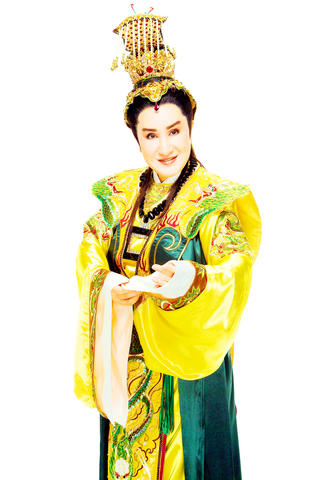A mong fans of gezai opera (歌仔戲), the Taiwanese answer to Beijing opera, the hottest ticket for next week is the premiere of a new production by local opera superstar Yang Li-hua (楊麗花), who is making a comeback after seven years away from the stage. The four performances of Dan Xin Jiu Ju (丹心救主), starting on Thursday, have already sold out despite higher-than-average ticket prices. This comeback, part of National Theater and Concert Hall's 20th anniversary celebrations, will have the star, now 63, pushing her limits as she takes on three very different roles in a complex story of palace intrigue.
Yang is routinely given the title of "National Treasure," and this new work follows on three phenomenally successful performances at the National Theater during the 1990s. Yang was one of the first opera stars to bring gezai opera to major venues such as the National Theater. She has been followed by others, including the Ming Hwa Yuan Taiwanese Opera Company (明華園戲劇團) and the Tang Mei Yun Taiwanese Opera Company (唐美雲歌仔戲團), who have all contributed significantly to lifting gezai opera from the curbside and placing it firmly and confidently in the temples of art and culture. Nevertheless, Yang is credited as the pioneer, and her career, which spans stage, television and film, has been devoted to preserving Taiwan's most popular operatic form.
Gezai opera is often criticized for not having the sophistication or elegance of Beijing opera. It was popular at temple fairs and local celebrations, and appealed to audiences with accounts of involved stories and clever improvisation.

Yang, who was born into a theatrical family began her carrier at just over 10 years old. She was one of the first people to respond to the challenge posed by TV and cinema and use it to her advantage. She helped create many TV operas through the 1970s, and by focusing on characters and plot, helped broaden the audience for gezai opera. Her popularity extends beyond Taiwan, and performances by Yang can even now be seen on Mac TV, the multimedia news and information site of the Overseas Compatriots Affairs Commission (僑務委員會).
Yang's return to the stage has encouraged many other prominent gezai performers to sign up for this production, ensuring that Dan Xin Jiu Ju is likely to be the greatest gathering of gezai talent the stage has seen in a while. Due to the scale and complexity of the production, two directors have been brought in, including the highly-respected Chu Lu-hao (朱陸豪), who has built his reputation in Beijing opera.
Performances of Dan Xin Jiu Ju will take place at the National Theater, Taipei. Performances at 7:30pm Thursday, Oct. 26 and Oct. 27 and at 2:30pm Oct. 28. Tickets are NT$600 to NT$5,000. The show is sold out.


“Why does Taiwan identity decline?”a group of researchers lead by University of Nevada political scientist Austin Wang (王宏恩) asked in a recent paper. After all, it is not difficult to explain the rise in Taiwanese identity after the early 1990s. But no model predicted its decline during the 2016-2018 period, they say. After testing various alternative explanations, Wang et al argue that the fall-off in Taiwanese identity during that period is related to voter hedging based on the performance of the Democratic Progressive Party (DPP). Since the DPP is perceived as the guardian of Taiwan identity, when it performs well,

June 9 to June 15 A photo of two men riding trendy high-wheel Penny-Farthing bicycles past a Qing Dynasty gate aptly captures the essence of Taipei in 1897 — a newly colonized city on the cusp of great change. The Japanese began making significant modifications to the cityscape in 1899, tearing down Qing-era structures, widening boulevards and installing Western-style infrastructure and buildings. The photographer, Minosuke Imamura, only spent a year in Taiwan as a cartographer for the governor-general’s office, but he left behind a treasure trove of 130 images showing life at the onset of Japanese rule, spanning July 1897 to

The Taiwan People’s Party (TPP) on May 18 held a rally in Taichung to mark the anniversary of President William Lai’s (賴清德) inauguration on May 20. The title of the rally could be loosely translated to “May 18 recall fraudulent goods” (518退貨ㄌㄨㄚˋ!). Unlike in English, where the terms are the same, “recall” (退貨) in this context refers to product recalls due to damaged, defective or fraudulent merchandise, not the political recalls (罷免) currently dominating the headlines. I attended the rally to determine if the impression was correct that the TPP under party Chairman Huang Kuo-Chang (黃國昌) had little of a

At Computex 2025, Nvidia CEO Jensen Huang (黃仁勳) urged the government to subsidize AI. “All schools in Taiwan must integrate AI into their curricula,” he declared. A few months earlier, he said, “If I were a student today, I’d immediately start using tools like ChatGPT, Gemini Pro and Grok to learn, write and accelerate my thinking.” Huang sees the AI-bullet train leaving the station. And as one of its drivers, he’s worried about youth not getting on board — bad for their careers, and bad for his workforce. As a semiconductor supply-chain powerhouse and AI hub wannabe, Taiwan is seeing